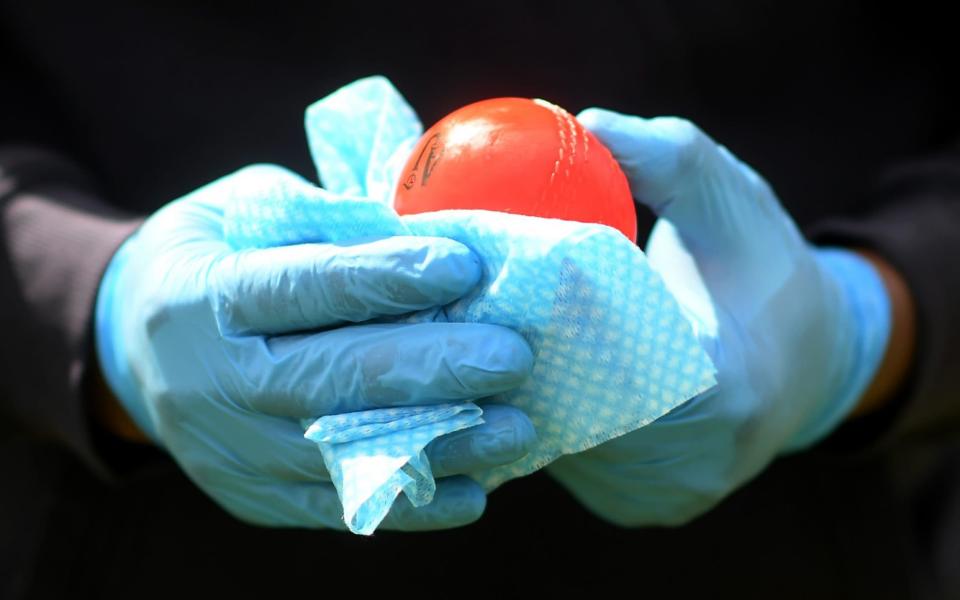No coronavirus threat from cricket balls, new research concludes as matches set to return


Coronavirus does not survive on cricket balls, new research has shown, as Boris Johnson said club matches could resume next weekend.
On Friday the Prime Minister said new guidance would be issued next week, after a senior government advisor admitted there was no scientific basis for stopping matches.
Speaking at a press briefing from Downing Street, Mr Johnson said: “I sought scientific advice and medical opinion from the third umpire and what I can say is we do want to work as fast as possible to get cricket back, and we will be publishing guidelines in the next few days so that cricket can resume in time for time weekend.”
Professor Chris Whitty, the Chief Medical Officer (CMO) said it was ‘perfectly possible’ to make outdoor sport work alongside social distancing.
Mr Johnson previously previously said cricket balls are a "natural vector of disease" – a statement described as "crackers" by former England captain Michael Vaughan.
New research by Imperial College London and the Karolinska Institute in Sweden, seen by The Telegraph, found that coronavirus was undetectable on cricket balls 30 seconds after they were smeared with an infected cloth.
Even when super-concentrated samples were used, a quick wipe with a paper tissue was enough to remove the virus.
"The transmission to another player is unlikely following these conditions," the research paper said. "Similarly, dropping and rolling the ball led to no evidence of viral contamination either, which could be because of motion or friction, potentially amplified by the shape of the ball."

A senior scientific adviser for the Government also said there was no scientific reason why cricket was a coronavirus risk.
"It's not something we are going to review scientifically," the adviser said. "I don't think the ball is a big vector, and I don't think there is a particular threat from cricket that I can see scientifically."
In an interview with LBC on Friday, Mr Johnson denied that the ball was the major problem in cricket and said: "There are various other considerations.
"Now, you've taken me into a sort of rabbit hole of detail when really I think what people understand is this is a battle against a pandemic which we have fought so far with the use of social distancing measures, and we're very largely winning.
"If you want the longer answer, which I think probably Chris Whitty [the chief medical officer] would give if he were here about cricket, the risk is not so much the ball – though that may be a factor – it's the teas, it's the changing rooms and so on.
"There are other factors involved which generate proximity which you might not get in a game of tennis."
The Government source accepted that clubhouses could be an issue "when everyone crowds in in an enclosed environment" but said there was no reason why the outdoor game itself could not continue.
The Department of Health also confirmed that the decision was not in its hands but was being taken by the Department for Digital, Culture, Media and Sport. Clubs in England had originally planned to return to play this weekend, but the department has given no indication of when they might be allowed to resume.
The England and Wales Cricket Board (ECB) said it was clear the risks were very low and called for the Government to urgently review the ban.
A spokesman said: "The ECB believes that cricket is a non-contact sport, with very low risks of exposure, and that it can be played as safely as many other activities being currently permitted.
"The detailed submission we have shared with the Department For Digital, Culture, Media and Sport includes advice on how we can stage cricket safely and mitigate all potential risks.
"We believe this advice – allied with strict hygiene measures – means recreational cricket should be viewed as safe by the UK Government, which would be welcome news to our nation's recreational cricketers."
Leading epidemiologists have said that provided other measures such as regular hand-washing and disinfecting the ball are taken, the risk of Covid-19 being transmitted between cricket players is minimal.
One expert from Oxford University said playing cricket in sunny weather is as low-risk as team sport gets, and countries such as Germany have allowed recreational cricket for several weeks.

